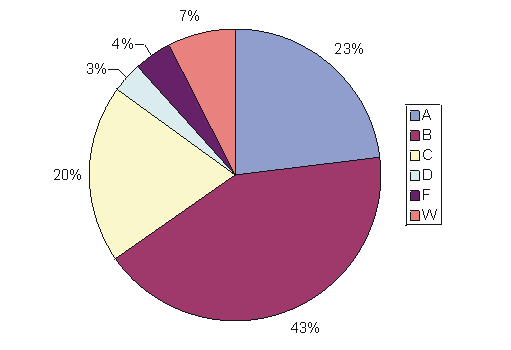| Grading Standards
Expectations for Students in My Courses James Hayes-Bohanan, Ph.D. Associate Professor, Geography Revised: June 29, 2004 |

|
| Grading Standards
Expectations for Students in My Courses James Hayes-Bohanan, Ph.D. Associate Professor, Geography Revised: June 29, 2004 |

|
Numeric Scale
The following numeric scale applies to exams or
other assessments in which the grade is based on a percentage. Any letter
grade may be converted to a numeric equivalent using this scale.
| Grade | Description | 4-point Equivalent | 100-point |
|
|
Superior |
|
|
|
|
Superior |
|
|
|
|
Good |
|
|
|
|
Good |
|
|
|
|
Good |
|
|
|
|
Satisfactory |
|
|
|
|
Satisfactory |
|
|
|
|
Satisfactory |
|
|
|
|
Poor |
|
|
|
|
Failure |
|
|
Some students think I am too tough, others think my course is too easy.
The results from three regular, day sections offered in 2003 can help you
decide for yourself:
Final grade distribution, GE196 Spring and Fall 2003
n=121 students

Writing Standards
I consider writing both the most important and the
most difficult aspect of student work to assess. To succeed in my classes,
you must read the writing tips I provide as part
of this web site. This includes both common, specific writing mistakes
and general advise on how to become a better writer.
Form and content are integral parts of effective writing. Poor style and grammar obscure whatever ideas the writer may be trying to convey, while well-written prose that does not communicate anything is also ineffective.
For this reason, I use the following matrix to assess
student writing. The scale along the top indicates content, or how well an
essay fulfills the objectives of an assignment. The scale along the left
side indicates the degree to which an essay reflects good style, grammar,
and organization. Letter grades are indicated for each combination, although
certain combinations (e.g., top-rated content and bottom-rated style) are
highly unlikely.
| 5. Original and creative response to assignment |
4. Fully meets expectations of assignment |
3. Mostly meets the intention of assignment |
2. Partly fulfills objectives of assignment |
1. Does not fulfill objectives of assignment |
0. Plagiarized |
|
| 5. Well-organized, no grammar or spelling problems, varied and interesting style |
|
|
|
|
|
|
| 4. Clear structure, few grammatical or spelling errors, effective style |
|
|
|
|
|
|
| 3. Moderate organizational, grammatical, and/or spelling problems |
|
|
|
|
|
|
| 2. Weak organization, substantial grammatical or spelling problems |
|
|
|
|
|
|
| 1. Difficult to read because of organization, grammar, or spelling |
|
|
|
|
|
|
I may indicate a writing grade in the format 5/5 - A, where the top number refers to content and the bottom number to grammar and style.
These standards apply to all writing assignments, although the standards are relaxed somewhat for essay exams, because of the reduced opportunity to proofread.
Class Participation
Class participation grades are determined as follows:
| A | Superior | Almost always present, prepared, and contributing |
| B | Good | Usually present, prepared, and contributing |
| C | Satisfactory | Usually present, and prepared; sometimes contributing |
| D | Poor | Often absent or unprepared; rarely contributing |
| F | Failure | Very often absent or unprepared; sometimes or often disruptive |
NOTE: "Contributing" does not simply mean talking a lot. Part of higher education is learning to participate effectively in a conversation about ideas. Questions and comments that reflect a lack of preparation or respect for others do not enhance participation.
Return to my Not-the-13th-Grade page.
Any questions? Contact me at jhayesboh@bridgew.edu.
James Hayes-Bohanan, Ph.D.
Bridgewater State College